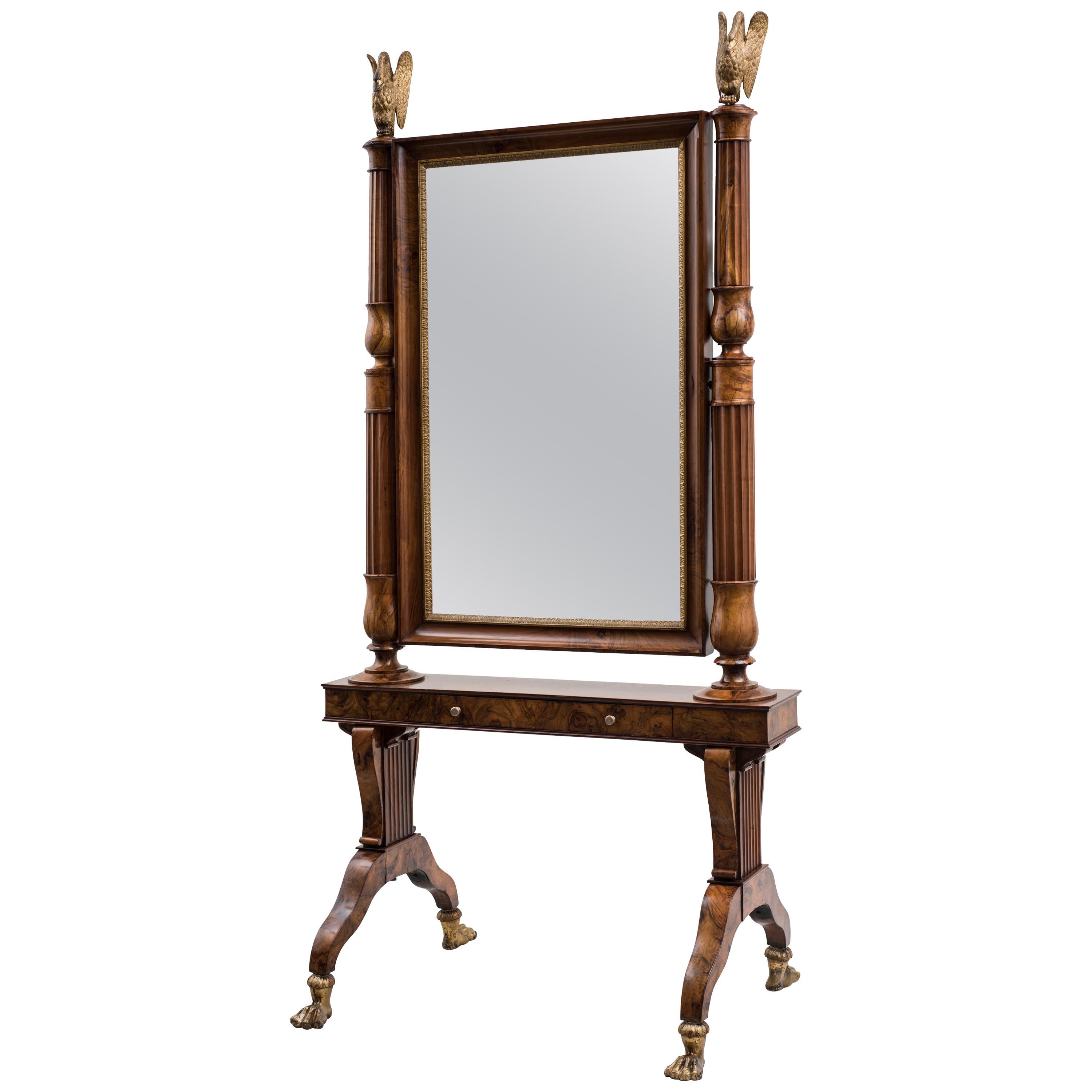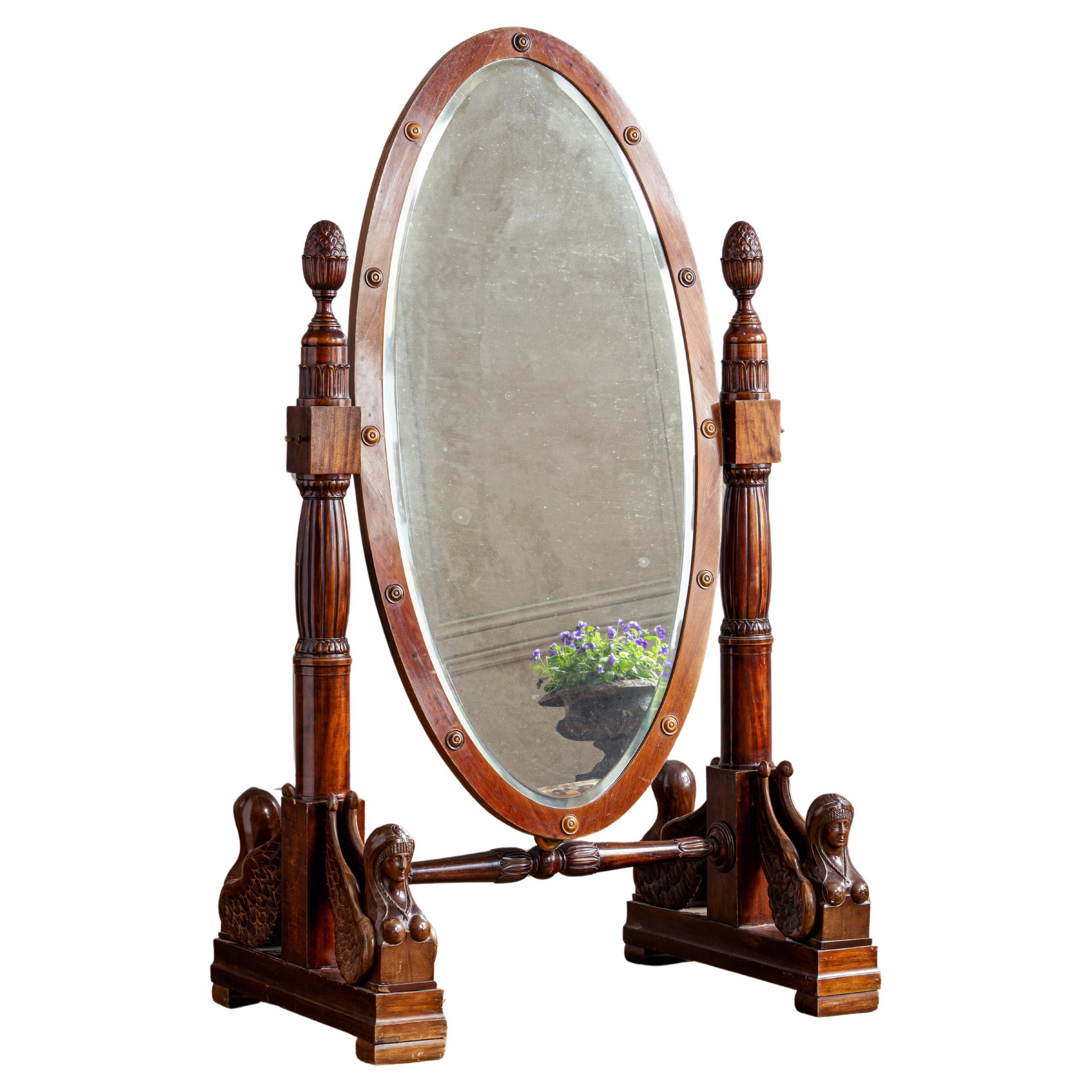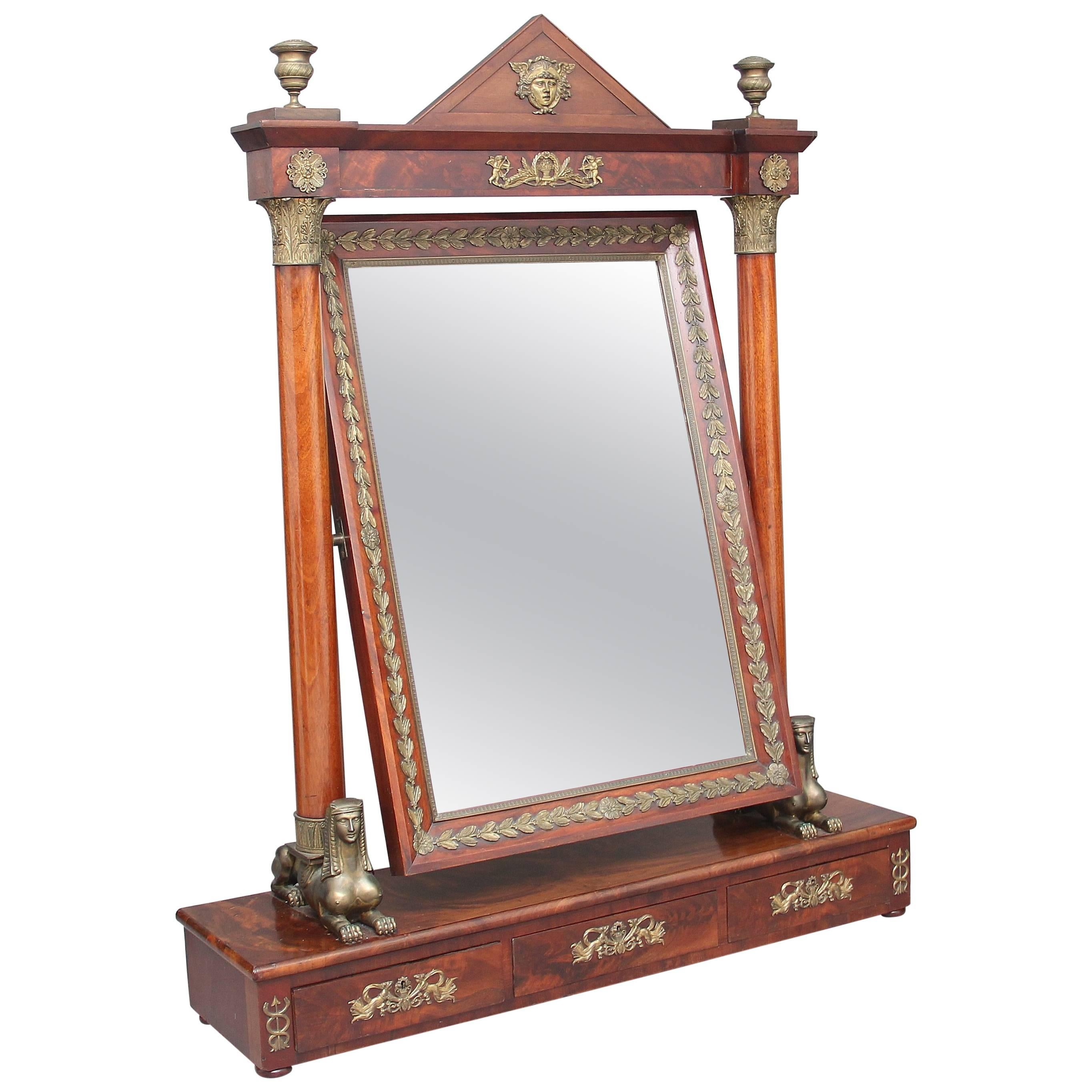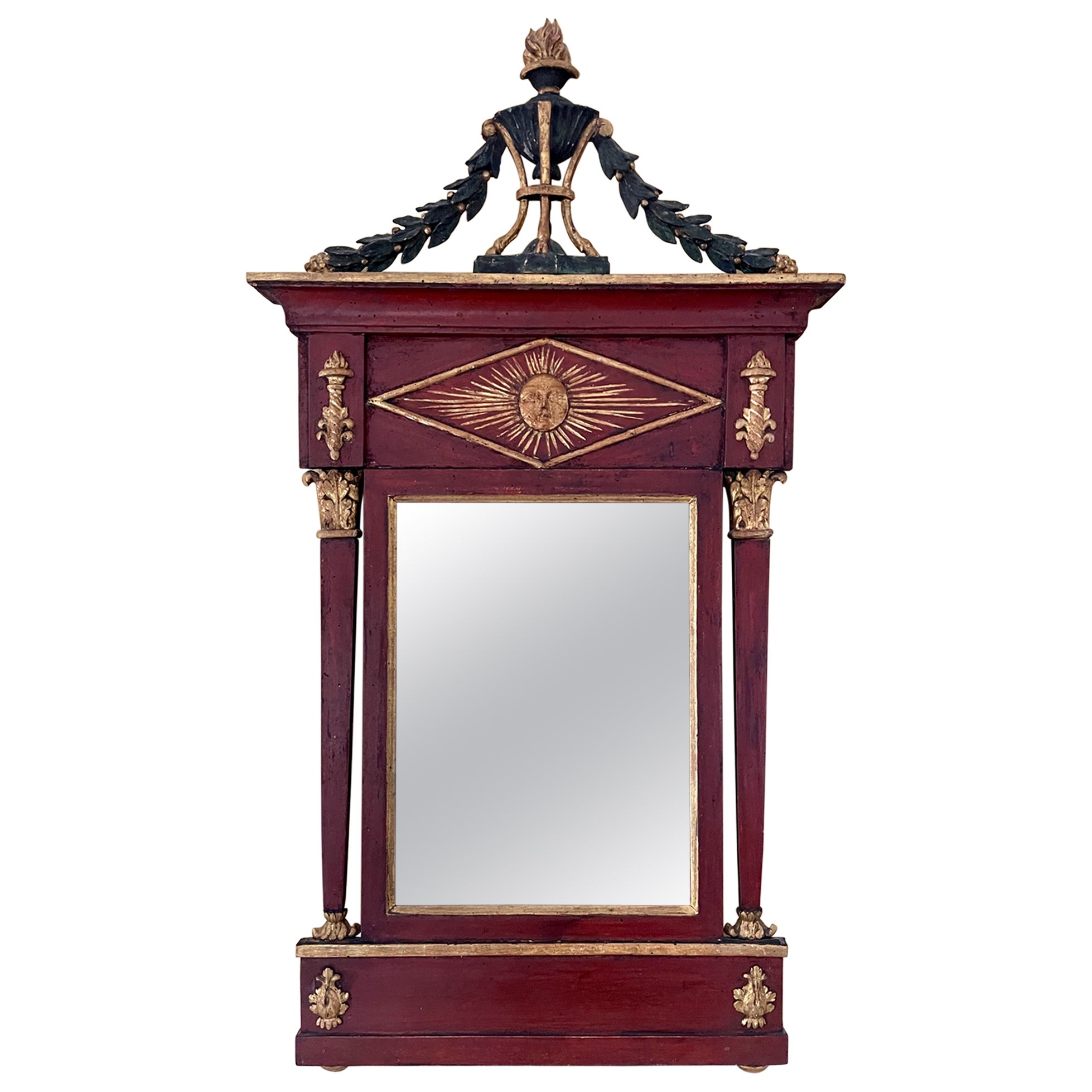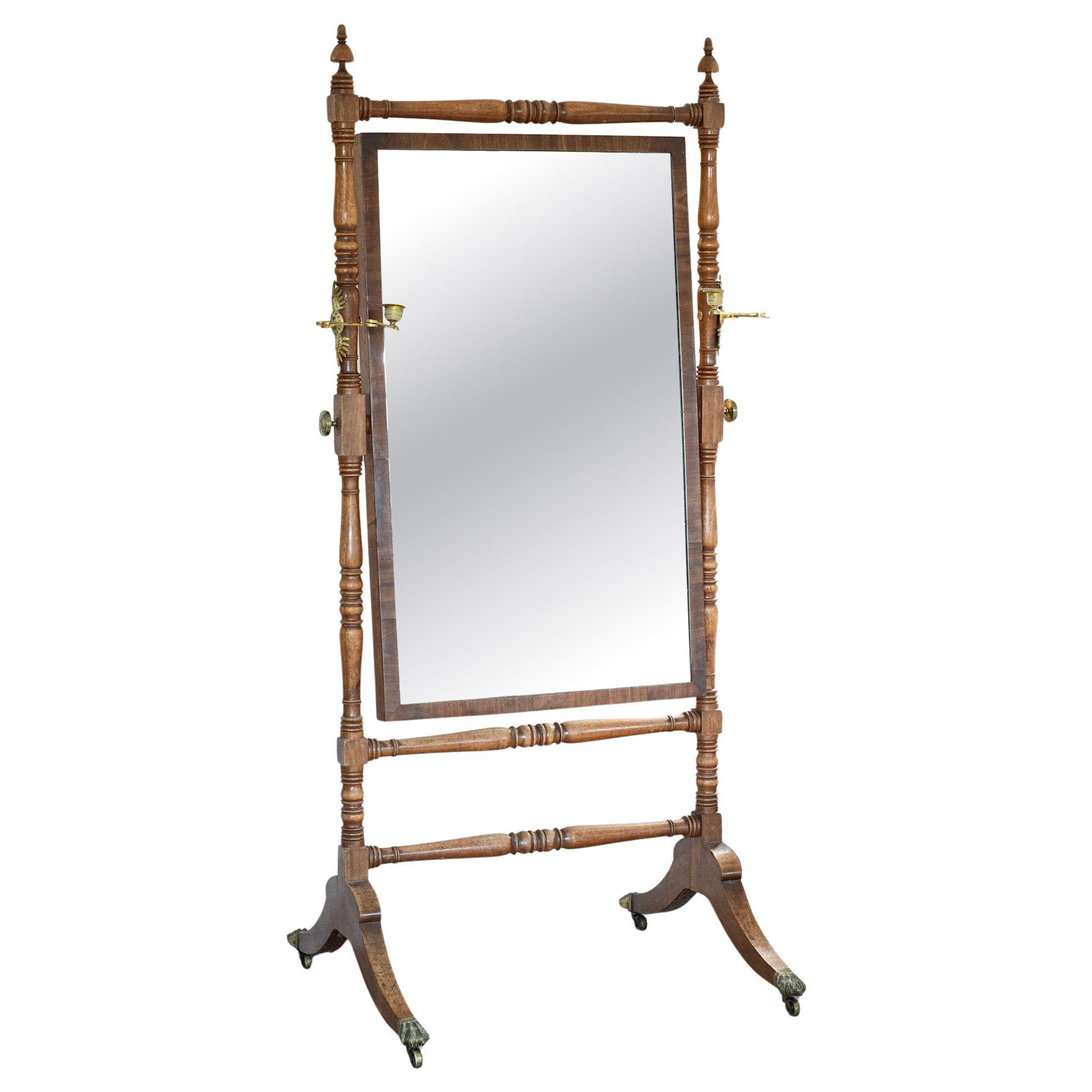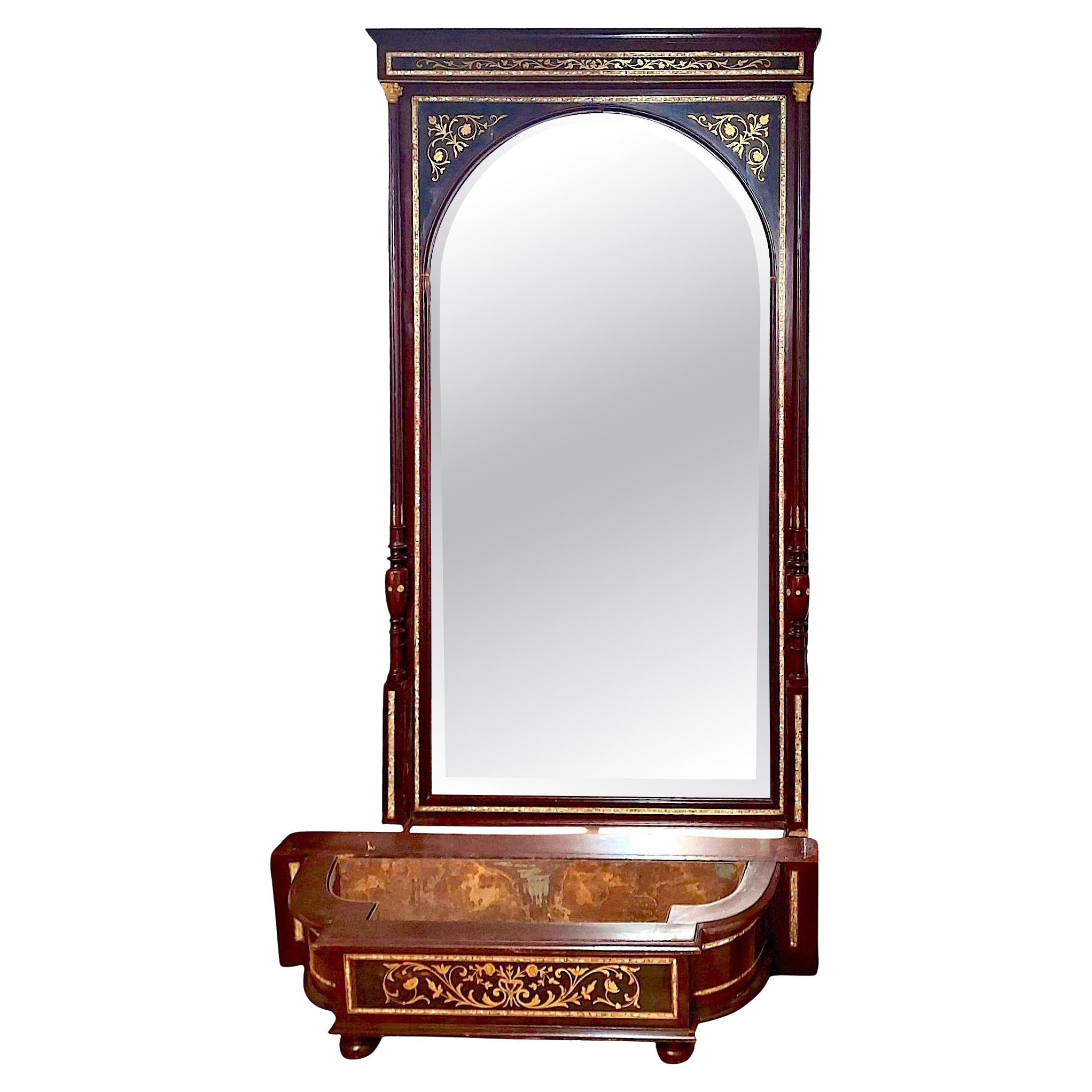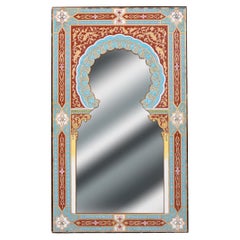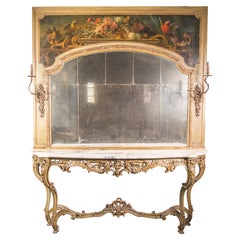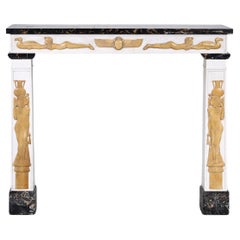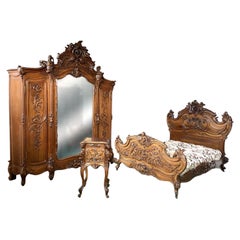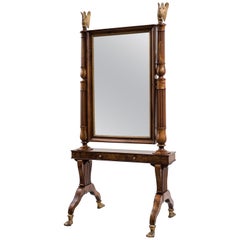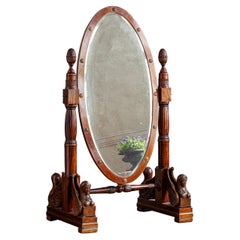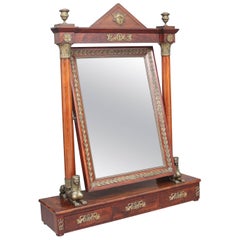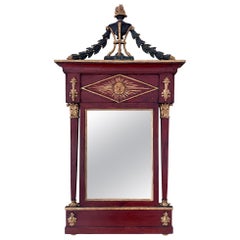Items Similar to Giuseppe PARVIS (attributed to), Egyptian Revival Mirror
Want more images or videos?
Request additional images or videos from the seller
1 of 12
Giuseppe PARVIS (attributed to), Egyptian Revival Mirror
$7,966.87
£6,053.85
€6,720
CA$11,180.31
A$12,191.08
CHF 6,336.30
MX$145,943.49
NOK 80,369.78
SEK 75,281.34
DKK 51,193.51
About the Item
This mirror, with its Egyptian-style design, was created by Giuseppe Parvis around 1900.
Giuseppe Parvis (1831-1909) studied at the Accademia Albertina in Turin. Fascinated by Egypt, he moved to Cairo in 1859 to design Egyptian-inspired furniture. The cabinetmaker and decorator quickly gained international fame through World and International Expositions, including those in Paris (1867), Philadelphia (1876), Milan (1881), and Turin (1884), where he received prestigious awards. Highly esteemed at the court of the Khedive of Egypt, he furnished several palaces before returning to Italy in 1900. By the early 20th century, Parvis was exporting a significant portion of his creations, exerting considerable influence on the market.
The base of the mirror features an inverted stylized lotus flower, within which the sculpted face of an Egyptian with a false beard is carved. This rests on a pink marble pedestal. Above it is an inverted headdress of an Egyptian deity, which may resemble one of the four statues located at the back of the sanctuary of Gerf Hussein in Egypt. The circular mirror is adorned with numerous pointed pendants. On the right and left, two serpents mimic the uraeus, the symbol of pharaonic authority, and two pendants with blue-and-white chevrons hang from them. The mirror is crowned with a scarab beetle with falcon wings, referencing the god Khepri. The back of the mirror is covered with embroidered fabric featuring geometric patterns characteristic of ancient Egypt, as well as the uraeus.
This mirror, born from an Italian’s passion for Egypt, fully embodies the spirit of Egyptomania, which persisted into the 20th century in the realm of European decorative arts.
- Dimensions:Height: 17.33 in (44 cm)Width: 7.88 in (20 cm)Depth: 3.55 in (9 cm)
- Style:Egyptian Revival (In the Style Of)
- Materials and Techniques:
- Place of Origin:
- Period:1900-1909
- Date of Manufacture:Circa 1900
- Condition:
- Seller Location:SAINT-OUEN-SUR-SEINE, FR
- Reference Number:Seller: 155701stDibs: LU7662243395392
About the Seller
No Reviews Yet
Recognized Seller
These prestigious sellers are industry leaders and represent the highest echelon for item quality and design.
1stDibs seller since 2022
6 sales on 1stDibs
Typical response time: 18 hours
- ShippingRetrieving quote...Shipping from: SAINT-OUEN-SUR-SEINE, France
- Return Policy
More From This Seller
View AllJacques Philippe Imberton, Oriental-Style Enameled Mirror
By Jacques-Philippe Imberton
Located in SAINT-OUEN-SUR-SEINE, FR
This superb mirror with polychrome enamel decoration is an exceptional piece inspired by Nasrid art, representative of the architectural and decorative forms of the Alhambra Palace.
Mr. Philippe Imberton is, at the present time, the king of enamel; he sows it on the glass, with a prodigal and brilliant hand, early by large plates, sometimes by light veins, but in such a way as to always produce the happiest decorative effects.
Article by Louis Enault in La Presse, published on September 25th, 1884.
The geometric and vegetal patterns are a real innovative achievement in the glass enameling industry. Arranged on a rectangular mirror, the enamels are elegantly composed and colored to form a Nasrid-inspired decoration, representative of a Mudejar architecture, and manifesting the cultural and artistic exchanges in the Iberian Peninsula in the 12th and 16th centuries. The outline of enamels in the form of a horseshoe arch is a typical element of Arabic-Andalusian architecture, visible from early Christian churches to converted mosques.
The horseshoe arch is supported by very thin columns with a concave base and molded rings, a unique type of column that appears only in the Alhambra Palace and indicates the passage to a sacred or royal place. The capital is divided into two bodies, the first of which is cylindrical and has a voluptuous floral decoration. Above, a prism decorated with a plant frieze with a rounded base delicately curves the whole mirror.
I have rarely seen more power combined with greater skill.
Article by Louis Enault in La Presse, published on December 17th, 1880.
The talent of the enameler is rendered by the richness of the polychrome ornamentation of the vegetal patterns, notably by the arabesques of the polylobed arch, that is to say small contiguous arches, each ending in a pointed arch, also polylobed. These arches also evoke the muqarnas vault, one of the most impressive decorative elements among the ornamentation used in the Alhambra. The alfiz, the frame that surrounds the outside of the arch, is decorated with intricate bands of red and yellow floral filigree.
The entire portico is framed by regular and harmonious friezes, decorated with vegetal motifs and structured by lines of small white flowers. Six wild pomegranate flowers, also known as balaustes, are framed on a white enamel background by the eight-pointed star, a recurring figure throughout Islamic art. The flowers are slightly open and accompanied by small pomegranate seeds, a connotation of fertility and the literal symbol of the city of Granada, where the Alhambra is located. The decoration is also characterized by four mirrored fleur-de-lis, as if to express the meeting of the two monotheistic influences in Granada. We can see the extent of refinement in the detail of the rhinestone fixtures that attach the glass mirror to a wooden support.
While the representation of human figures in Muslim art is prohibited, the reflections of faces in the mirror naturally thwart the ban. One can read in an article of the Arts Industriels, published in La Presse on September 25, 1884, some lines notifying a mirror preceding ours: It will not displease the women either to find themselves beautiful by reflecting their fresh faces in this pretty oriental mirror...
Category
Antique Late 19th Century French Moorish Wall Mirrors
Materials
Enamel
Louis XV style console and its mirror
Located in SAINT-OUEN-SUR-SEINE, FR
Important antique Louis XV style console, with a mirror and surmounted by a still life painting, made in the 19th century. The console is made out of lacquered wood and the table top...
Category
Antique 19th Century French Louis XV Furniture
Materials
Marble
Mantelpiece Adorned with Egyptian-Inspired Motifs
Located in SAINT-OUEN-SUR-SEINE, FR
This mantelpiece adorned with Egyptian-inspired decorations was crafted in three types of marble around 1830. The bases and capitals of the jambs, as well as the mantel, are made of ...
Category
Antique Early 19th Century French Egyptian Revival Fireplaces and Mantels
Materials
Marble, Carrara Marble, Statuary Marble
Louis XV style walnut bedroom
Located in SAINT-OUEN-SUR-SEINE, FR
Carved walnut bedroom set in Louis XV style, composed of:
Bed:
Headboard height: 171 cm
Footboard height: 99 cm
Width: approx. 171 cm (including footboard carvings)
Depth: approx. 2...
Category
Antique 19th Century French Louis XV Bedroom Sets
Materials
Walnut
$37,937 / set
Louis XVI Style Panelling with Louis XVI Period Mantel and Trumeau
Located in SAINT-OUEN-SUR-SEINE, FR
Rare Napoleon III style paneled room in blackened wood (stained beech) with its fireplace in stucco in imitation of porphyry.
The fireplace, which is the centerpiece of this paneled...
Category
20th Century French Napoleon III Panelling
Materials
Bronze
Armand Albert RATEAU (création) Baguès FRÈRES (exécution) double-porte Art déco
By Armand Albert Rateau, Maison Baguès
Located in SAINT-OUEN-SUR-SEINE, FR
This double door, based on a drawing by Albert Rateau, is a model very similar to the entrance of the Pavillon de l’Élégance at the International Exhibition of Modern Decorative and ...
Category
Vintage 1920s French Art Deco Doors and Gates
Materials
Wrought Iron
You May Also Like
Empire Style Mirror, Italy, Early 19th Century
Located in Roma, IT
Empire style mirror is a precious decorative object realized in Emilia (Italy) in the first fourth of the 19th century.
Splendid pivoting mirror (psicè) in walnut and briar of olive. The mirror frame is decorated with Empire leaflets. the mirror supports are fluted columns surmounted by two wooden carved and gilded eagles gilded...
Category
Antique Early 19th Century Italian Floor Mirrors and Full-Length Mirrors
Materials
Wood
$9,958 Sale Price
30% Off
19th Century Italian Cheval Mirror
Located in London, Park Royal
An elegant and imposing, 19th century, Italian cheval mirror made in solid mahogany. Belonged to a well known Italian actress of the golden age o...
Category
Antique 19th Century Italian Empire Floor Mirrors and Full-Length Mirrors
Materials
Wood
Large 19th Century French Empire Dressing Mirror
Located in Martlesham, GB
A very impressive large 19th century mahogany and ormolu French Empire dressing mirror with an Egyptian influence, the pyramid shaped top with an ormolu face flanked by ormolu urns, ...
Category
Antique 1820s French Empire Pier Mirrors and Console Mirrors
Materials
Ormolu
$3,167 Sale Price
20% Off
French Provincial Neoclassical Mirror
Located in New York, NY
French provincial neoclassical mirror. Red, green and gilt painted neoclassical style tabernacle form mirror with central plate flanked by tapering pilasters ...
Category
Antique Early 19th Century French French Provincial Wall Mirrors
Materials
Wood, Mirror
English 19th Century Cheval Mirror
Located in Southampton, GB
Cheval Mirror with candle sconces and lion paw feet.
England, cira 1900.
Height - 165.5cm
Width - 71cm
Depth - 67cmPlease message if any further info or photos are required
SHIPPI...
Category
Antique 19th Century British Regency Floor Mirrors and Full-Length Mirrors
Materials
Mirror, Sapele Wood
Late 19th-century Pier Mirror with Jardiniere Base
Located in San Francisco, CA
On offer is a highly decorative, antique pier mirror with an integrated jardiniere or planter base. This combination was especially popular in the 19th century for adding light, a to...
Category
Antique Late 19th Century Empire Revival Pier Mirrors and Console Mirrors
Materials
Metal, Brass
More Ways To Browse
Antique Marble Mirror
Antique Fabric Patterns
Gold Table Mirror
Egypt Table
Scarab Beetle
Crown Mirror Antique
Gold Mirror Marble
Pink Pedestal
Egyptian Marble Table
Egypt Mirror
Inverted Mirror
Pink Marble Pedestal
Egyptian Antique Mirror
Makeup Magnifying Mirror
Mens Shaving Mirror
Rolex Vintage Mirror
Three Mirror Dressing Table
Vintage Wooden Dressing Table Mirror
